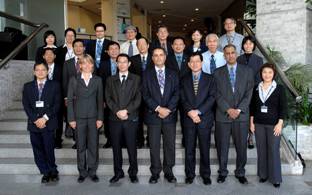
In this age of globalization, cooperation and collaboration between regional countries becomes of utmost important. This is particularly where crimes and criminal activities are no longer limited by the physical borders.
In the last three decades, numerous forensic science networks have been formed in the various regions of the world, and these include the formation of the American Society of Crime Laboratory Directors (ASCLD) in 1974 for America, the Senior Managers of Australian and New Zealand Forensic Laboratories (SMANZFL) in 1986 for Australia and New Zealand, the European Network of Forensic Science Institutes (ENFSI) in 1995 for Europe, and the Academia Iberoamericana De Criminalistica Y Estudios Forenses (AICEF) in 2004 for Latin America, Spain and Portugal.
In Asia, although there was no formal network before the formation of the Asian Forensic Sciences Network (AFSN), various cooperation and collaboration was evident. An annual regional newsletter DrugNetAsia has been published as a result of a regional Consultative Meeting for the Heads of Drug Testing Laboratories in Southeast Asia organized by UNDCP (the previous name for UNODC) which was held in Hong Kong SAR in 1999. This newsletter has served as a platform for information sharing among the drug testing laboratories in the region.
In 2006, a regional DNA Symposium on Forensic DNA and Population Statistics Workshop was held in Singapore which featured leading forensic experts from the United States, Thailand, Indonesia, Malaysia and Vietnam.
In 2007, a regional Forensic DNA Profiling Workgroup was formed due to the need to share information after the 2004 tsunami. In the same year, Dr Barbara Remberg of UNODC put forward the idea of forming a regional network during a regional UNODC project workshop on precursors and illicit drugs.
In October 2008, representatives from six national forensic institutes in the region converged in Singapore to discuss the issue of the formation of a regional forensic science network. The six institutes are: Department of Scientific Services, Brunei Darussalam; Department of Chemistry, Malaysia; National Bureau of Investigation, Philippines; Central Institute of Forensic Science, Thailand; Forensic Science Institute, Vietnam and Health Sciences Authority, Singapore. Dr Barbara Remberg of UNODC and Prof Jose Lorente, International Liaison Officer of AICEF were also present at the meeting. This meeting gave birth to Asian Forensic Sciences Network (AFSN) which will henceforth serve as a collective representation for the forensic science community in Asia. |